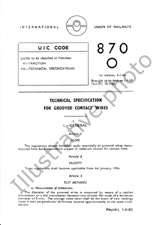We need your consent to use the individual data so that you can see information about your interests, among other things. Click "OK" to give your consent.

UIC 201-2ed.
Carriage of dangerous goods - Emergency planning guidance for rail marshalling yards
STANDARD published on 1.9.2012
| Availability | Sold out |
| Price | ONREQUEST excl. VAT |
| ON REQUEST |
The information about the standard:
Designation standards: UIC 201-2ed.
Publication date standards: 1.9.2012
SKU: NS-550073
The number of pages: 61
Approximate weight : 183 g (0.40 lbs)
Country: International technical standard
Annotation of standard text UIC 201-2ed. :
Summary:
The International Union of Railways (UIC) was established on 20 October 1922 at the International Paris Conference. Its remit was to unify and improve the establishment of operating conditions for the railways in an international traffic perspective, i.e. as the rail transport standardisation body. Since that date, the UIC has kept on growing and now consists of 200 member bodies from almost a hundred countries from the five continents in many areas of competence. At the UN, UIC has observer status.
UIC aims at developing international cooperation between rail enterprises and promoting worldwide the merits of international rail transport services. It maintains and develops the overall coherence of the rail system and implements engineering, operational and commercial interoperability requirements. UIC represents railway interests in lobbying and influencing decision-makers and the general public.
The Community of European Railways (CER) was created in 1988 to represent the interests of the rail organisations of the EU countries as well as some other countries in Europe in dealings with the European Unions authorities.
UIC Leaflet 471-3 provides a coherent approach applicable to all marshalling yards. In 2003 it was officially referenced as "best practices" in the Regulations concerning the International Carriage of Dangerous Goods by Rail (RID). The present version takes into account significant changes in rail legislation in the European Union to ensure coherence at European and a broader international level. In addition, the text outlining the context has been amended. Given past experience however, the bulk of the guidance document has not been amended.
Name:Transport gefährlicher Güter - Leitfaden für die Notfallplanung in Rangierbahnhöfen
Zusammenfassung:
Der internationalen Eisenbahnverband (UIC) wurde am 20. Oktober 1922 auf der Internationalen Konferenz in Paris gegründet. Seine Aufgabe als Standardisierungsorgan bestand vor allem darin, die Betriebsbedingungen der Eisenbahnen im Hinblick auf den internationalen Verkehr zu vereinheitlichen und ihre Einführung zu verbessern. Inzwischen ist die UIC ständig gewachsen und zählt heute 200 Mitglieder verschiedener Kompetenzbereiche aus beinahe hundert Ländern aller fünf Kontinente. Bei den UN genießt die UIC Beobachterstatus.
Ziel der UIC ist es, die internationale Zusammenarbeit zwischen den Eisenbahnen zu fördern und weltweit für die Vorzüge des internationalen Schienenverkehrs zu werben. Sie sorgt für die Kohärenz des gesamten Bahnsystems und die Realisierung der technischen, betrieblichen und wirtschaftlichen Interoperabilität. Darüber hinaus hat sie die Aufgabe, die Vorteile der Schiene bei Entscheidungsträgern und öffentlichkeit ins rechte Licht zu setzen.
Die Gemeinschaft der Europäischen Bahnen (GEB) wurde 1988 gegründet, um die Interessen der Eisenbahnen der Europäischen Union und einiger anderer europäischer Länder gegenüber den EU-Instanzen zu vertreten.
Das UIC-Merkblatt Nr. 471-3 stellt einen kohärenten Ansatz dar, der auf alle Rangierbahnhöfe angewendet werden kann. 2003 wurde es offiziell als "Gute Praxis" in der Ordnung für die internationale Eisenbahnbeförderung gefährlicher Güter (RID) ausgewiesen. Die vorliegende Version berücksichtigt die Entwicklung der EU-Gesetzgebung, sodass die Kohärenz zwischen der europäischen und der internationalen Gesetzgebung sichergestellt ist. Ferner wurde die Beschreibung des Kontextes angepasst. Auf Grund der Erfahrungen wurden die Hauptinhalte des Leitfadens jedoch nicht verändert.
ISBN: : 978-2-7461-2099-0
We recommend:
Updating of laws
Do you want to be sure about the validity of used regulations?
We offer you a solution so that you could use valid and updated legislative regulations.
Would you like to get more information? Look at this page.



 Cookies
Cookies
